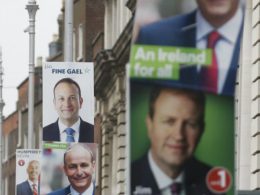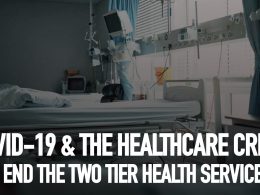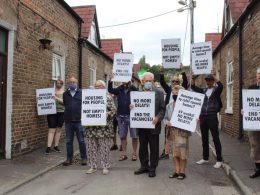By Jonathan Diebold
“They said it was going to be a giveaway budget. It isn’t a giveaway by any means… It’s a load of rubbish. If they think for one minute this budget will get my vote, they will not” – Teresa O’Callaghan (66), a pensioner in Mayo, quoted in the Irish Times.
Bumper corporate tax receipts and an influx of Apple billions – which the government fought so hard to prevent – have left this Government with an unprecedented budget surplus, while many countries across Europe are experiencing brutal deficits. However, the Government was totally unwilling to invest in the long-term needs of working-class people, such as in building public homes and hiring the necessary staff for our health service at a time when there are dangerous levels of understaffing.
Trying to buy an election
The bulk of the €10.5 billion spending package has gone to one-off payments, almost all kicking in next month, just before the widely rumoured election date, in what is obviously and widely acknowledged as an attempt to buy votes. This has been touted as such by organisations from IBEC and ICTU, to the Irish Times. A poll by the Irish Independent found that most wanted the €14 billion Apple windfall to be spent on things like infrastructure projects (32%), fixing the health service (28%), and building more houses (25%). Only 1% said the money should be spent on ‘giveaway’ budgets.
Most are well aware that a few hundred euro, although welcome, won’t get people through the year. For many, it won’t even get them through Christmas. The Economic and Social and Research Institute (ESRI) said that while the average house will make “small gains” from this budget, it will not reduce overall poverty levels. But that’s not what this shortsighted spending is for: not to genuinely improve people’s lives in a tangible, long-lasting way. Rather, it’s merely meant as a cynical tool to shore up votes instead of investing in health, housing, childcare, or any other crisis-ridden sector of society.
Weakness of Irish capitalism
This Budget reflects the fundamental weakness of Irish capitalism rather than the strength of the Government’s financial policy. The budget surplus is only there as a combination of the Apple taxes, which the government spent €10 million in legal fees trying not to reject, and an unexpected windfall of corporation tax – a precarious income without which the state would be operating a €2.7 billion deficit according to the Irish Fiscal Council, or €6 billion according to the Department of Finance. Excluding these corporate taxes, this would be its 18th budget deficit in a row.
Even when they can no longer use the argument that the resources aren’t there to effect real change, they are still incapable of breaking from the logic of the capitalist market. But the resources have always been there, far beyond the bumper budget surpluses. It is estimated that corporations profited to the tune of €300 billion last year, having trebled in the last decade. Irish society is flush with wealth, but the rigged nature of the system means that it will never “trickle down” to people in a manner that will meet their needs. A low-tax on-profits policy also means low investment in public services.
The government’s ideological commitment to the market can be seen with building companies like BAM being allowed to suck billions from the state coffers, not just on the Children’s Hospital but on dozens of other projects besides. Such massive entities like this, whose raison d’etre is to generate profits, should be brought into public ownership and replaced with a state-owned, not-for-profit construction company with a laser-like focus on social and affordable housing.
Radical change is needed
As Socialist Party TD Mick Barry told the Dáil: “If we had a government in the State that was prepared, in the interests of the very many, to go after the wealth that has been cornered by the very few, and couple it with the Apple tax money and the State surplus that is there, and if we had a government with a vision of a better society, better public services and better lives for ordinary people, we could have had a transformational budget… we could have a free national health service, free public transport and free State-provided childcare. These were within the grasp of a Government that had vision and that was prepared to take on the vested interests in society.”
The Fianna Fáil, Fine Gael, and Green Party government will not present the kind of change that is needed. Nor will Sinn Féin, whose shiny new housing policy document, A Home of Your Own, seeks to enable “landlords to make a reasonable return on their investment,” sending a clear signal that it has no interest in shaking up the housing market.
Radical change is needed. Investing such massive surpluses in things like health and housing is vital, but true change would require a break with the capitalist system – taking the key wealth and resources in society into democratic public ownership as part of a socialist plan to meet the needs of all people and the planet.












